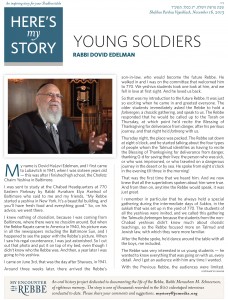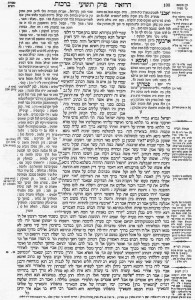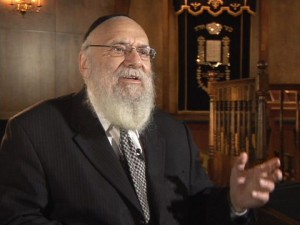HMS: Young soldiers
My name is Dovid HaLevi Edelman, and I first came to Lubavitch in 1941, when I was sixteen years old – this was after I finished high school, the Chofetz Chaim Yeshiva in Baltimore.
I was sent to study at the Chabad Headquarters at 770 Eastern Parkway by Rabbi Avraham Elya Axelrod of Baltimore who said to me and my friends, “My Rebbe started a yeshiva in New York. It’s a beautiful building, and you’ll have fresh food and everything good.” So, on his advice, we went there.
I knew nothing of chasidism, because I was coming from Baltimore, where there were no chasidim around. But when the Rebbe Rayatz came to America in 1940, his picture was in all the newspapers including the Baltimore Sun, and I happened to see the paper with the Rebbe’s picture. When I saw his regal countenance, I was just astonished. So I cut out that photo and put it on top of my bed, even though I didn’t know who the Rebbe was. And then, a year later I was going to his yeshiva.
I came on June 3rd, that was the day after Shavuos, in 1941.
Thirty days later, there arrived the Rebbe’s son-in-law, who would become the future Rebbe. He walked in and I was on the committee that welcomed him to 770. We yeshiva students took one look at him, and we fell in love at first sight. And he loved us back.So that was my introduction to the future Rebbe. It was just so exciting when he came in and greeted everyone. The older students immediately asked the Rebbe to hold a farbrengen, a chasidic gathering, and speak to us. The Rebbe responded that he would be called up to the Torah on Thursday, at which point he’d recite the Blessing of Thanksgiving for deliverance from danger, after his perilous journey, and that night he’d farbreng with us.
Thursday night, the place was packed. The Rebbe sat down at eight o’clock, and he started talking about the four types of people whom the Talmud identifies as having to recite the Blessing of Thanksgiving for deliverance from danger, thanking G-d for saving their lives: the person who was sick, or who was imprisoned, or who traveled on a dangerous journey in the desert or by sea. He spoke from eight o’clock in the evening till three in the morning!
That was the first time that we heard him. And we now knew that all the superlatives spoken about him were true. And from then on, anytime the Rebbe would speak, it was just great.
I remember in particular that he always held a special gathering during the intermediate days of Sukkos, in the sukkah that was set up in the yard of 770. The students of all the yeshivas were invited, and we called this gathering the Talmudic farbrengen because the students from the non-Chabad yeshivas didn’t know much about chasidic teachings, so the Rebbe focused more on Talmud and Jewish law, with which they were more familiar.
After the Rebbe spoke, he’d dance around the table with all the boys, me included.
The Rebbe was very interested in us young students – he wanted to know everything that was going on with us, every detail. And I got an audience with him any time I wanted.
With the Previous Rebbe, the audiences were limited. The older chasidim were invited up to his apartment upstairs, and they crowded into the dining room where the Rebbe held his gatherings. But us students, we were not allowed in, because there was no room. But still we hoped. We would stand for hours and hours on the steps, waiting for the door to open, hoping we’d get in.
One year – I remember this vividly – it was Simchas Torah. The Previous Rebbe and the older chasidim were upstairs where they finished the hakafos, the circuits with the Torah, while we prayed downstairs in the sukkah. We were there singing and dancing till wee hours. And then, about three o’clock in the morning, all of the sudden, the future Rebbe came downstairs. And he saw about fifteen students dancing.
So he came into the sukkah and asked us, “Did you complete all the seven hakafos?” So we looked at him surprised. No, we hadn’t. The older chasidim got hakafos, but us teenagers?! So the Rebbe said: “Bring a Torah scroll out and we’ll do the hakafos.” The Rebbe cared that even we should have hakafos, and we did all seven.
A few years later, after the Rebbe assumed leadership, I remember him getting up on a chair on Simchas Torah. He said “Bring a bottle of vodka.” And when they brought it, he said, “Anybody who will say he’s going to add to his learning this year, I’ll give him a L’chaim.”
Of course, we all volunteered – everybody! And the Rebbe gave each and every one of us a L’chaim, and then the Rebbe sang a chasidic melody. Oh, that was divine – it was so beautiful.
He did it because he cared about his bochurim, his boys. And I’ll tell you another story of what he thought of us.
In 1973, on Yom Kippur, the Arabs attacked Israel. In New York, everybody was so upset by what was going on; the news we heard was very scary … We didn’t know what to do or think.
That year, on Simchas Torah, while the war was still raging, a delegation from the Israeli embassy came to pay a call to the Rebbe, as they did every year. And among them was a representative of the Israeli army attached to the embassy.
The Rebbe gave them the fifth circuit with the Torah and before that the representative of the army spoke to him. I was standing next to the Rebbe, and I heard the exchange. The military man said, “Rebbe, I want you to know that the war has been won. Right now, it’s just a mop-up operation.”
In fact, the war lasted one more week. Some 2,800 Jews had died and another 8,000 were wounded before it was over. It was a terrible war – the Arabs had surprised Israel – and things had gone very badly in the beginning.
So the Rebbe said to the military man: “The reason you had a problem is because the General Staff of the army is too old.”
He responded, “Rebbe, you’re right, we know … that’s why forty percent of the General Staff are now younger officers.”
“That’s not enough!” the Rebbe said, and he pointed to all the students who were there. “These are my chayolim – my soldiers. Ninety percent of them are under twenty years old! The young ones can scale anything!”
I was no longer a student at that point but, when I heard that, I felt so invigorated and inspired. How the Rebbe loved his boys!
Rabbi Dovid Edelman and his wife Leah have been Chabad emissaries in Springfield, Massachusetts for over 50 years. They were interviewed in their home in July, 2008.
This week’s Here’s My Story is dedicated
in loving memory of
Avraham ben Yitzchak
By his children Yitzchok & Rochel Shlomo








No Comments to “HMS: Young soldiers”